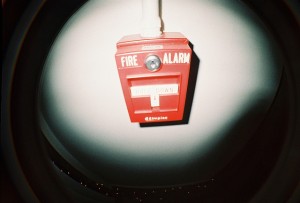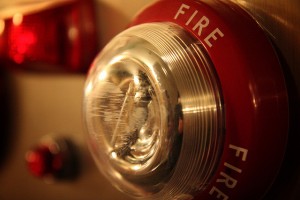 As with anything in the security systems industry, prevention is vital. Preventing catastrophic loss is a top priority and one of the most crucial security system components that helps avoid such situations is the fire alarm system. This is a no brainer, but there is some disparity between what type of fire alarm system is best. In the alarm industry there are basically two types of fire alarm installations, conventional and addressable (or analog addressable). As always, every situation and application is different therefore claiming one system is superior to the other may not be the right approach. However, it is important to understand the difference between systems and why one might be used over the other.
As with anything in the security systems industry, prevention is vital. Preventing catastrophic loss is a top priority and one of the most crucial security system components that helps avoid such situations is the fire alarm system. This is a no brainer, but there is some disparity between what type of fire alarm system is best. In the alarm industry there are basically two types of fire alarm installations, conventional and addressable (or analog addressable). As always, every situation and application is different therefore claiming one system is superior to the other may not be the right approach. However, it is important to understand the difference between systems and why one might be used over the other.
Regardless of the type of system installed, all have to meet the National Fire Protection Association (NFPA) codes, local regulations, and the Life Safety Code enforced by the authority having jurisdiction (AHJ). All commercial buildings are required to have a code compliant fire alarm system, the best way to ensure proper installation is to hire a licensed integrator with knowledge and experience. Our licensed experts at Perfect Connections, Inc. have been providing comprehensive security system solutions, including fire alarms, to facilities throughout northern and central New Jersey for the past 23 years. We stay updated on current technologies and how they may benefit our customers, implementing solutions that fit individualized needs. It’s also part of our mission to help our clients gain a better understanding of the systems that we install.
To understand the difference between an addressable fire alarm system and a conventional one you must first understand what a fire alarm system is. In general a fire alarm system is a group of visual and audio devices (automatic and/or manual)-i.e. smoke detectors, heat sensors, strobes, alarm pulls, and sprinklers-linked to a main fire panel that sends a signal to local emergency responders when an alarm is activated. Each device has to be linked to the main fire panel, but there are different methods of doing so. This is where the big difference between addressable and conventional comes into play.
 Addressable fire alarms indicates that each installed device or module is connected to the main fire panel in a “loop” often by means of a singular wire. Conventional alarm systems require individual wires per each device, again connecting back to the main fire panel. The most obvious difference between the two, in terms of installation, is cabling requirements and labor costs. Due to the fact that addressable systems require less cabling they make for less complex installations. That’s not to say there aren’t situations where a conventional system might make more sense. Although it seems most new construction projects implement addressable systems.
Addressable fire alarms indicates that each installed device or module is connected to the main fire panel in a “loop” often by means of a singular wire. Conventional alarm systems require individual wires per each device, again connecting back to the main fire panel. The most obvious difference between the two, in terms of installation, is cabling requirements and labor costs. Due to the fact that addressable systems require less cabling they make for less complex installations. That’s not to say there aren’t situations where a conventional system might make more sense. Although it seems most new construction projects implement addressable systems.
One of the many benefits of an addressable fire alarm system is that each device is given its own unique address. In the event of a triggered alarm a single device can be pinpointed which gives responders a more concise location as to where a fire might be occurring. This helps save precious time and improves life safety. It’s also helpful in the event a device is malfunctioning or requires maintenance. According to Jim Kimpel, product manager for Fire Control Instruments, Inc., being able to pinpoint specific devices lessens the hesitation an end-user might have-mostly caused by the fear of costs-when making a service call. This helps prevent unnecessary losses due to a defunct system.
As with any alarm system, routine inspections are required for addressable fire alarm systems. According to Brandt Phillips, Commercial Fire & Security Director of Sales for Napco Security Technologies Inc., inspections and system testing are made easier with addressable systems. He says installing an addressable system, “…eliminates the need for expensive testers, excessive labor for testing, and gives you the ability to automatically generate the same reports directly from the software you used to program the panel…” In comparison Phillips points out that inspections for conventional systems can cost thousands and be quite lengthy.
While conventional systems may require extensive wiring, intensive testing, a higher labor cost, and are being phased out by addressable alarms, they’re not completely disregarded when it comes to installations. The size of a project may determine what type of system is a better fit. It seems that for small jobs, i.e. a single story office building, conventional systems may work just fine. They’re initial upfront costs are fairly low and if you’re not dealing with multiple floors and zones it may not be necessary to implement an addressable system. However, the appeal of quick installs, concise reporting of fire occurrences, and the ease of inspection and system testing will continue to draw support for addressable systems; it seems to be the trend in most new construction projects.
With fire and life safety codes continually evolving, in tandem with developing technologies, there’s no telling what advancements will emerge next. For now, streamlining processes and incorporating intelligent components will continue to help shape the fire alarm systems of today. Our licensed experts at Perfect Connections, Inc. are committed to providing security systems that enhance life safety and help prevent disasters. We have been installing comprehensive security system solutions, including fire alarms, to facilities throughout northern and central New Jersey since 1992. Don’t wait for the unpredictable to happen, let us help you protect what matters most.
If you live or run a business in Central or Northern New Jersey and would like information on any of the topics discussed above, please call 800-369-3962 or simply CLICK HERE.
Image Credit: Image #1 by shlala-Flickr-Creative Commons, Image #2 by fire-magazine.com
 Fire is an unpredictable force that can wreak havoc on any business. It is imperative as a business owner, facility manager, or building owner that the proper precautions are in place to help prevent catastrophe. The
Fire is an unpredictable force that can wreak havoc on any business. It is imperative as a business owner, facility manager, or building owner that the proper precautions are in place to help prevent catastrophe. The 
 being tested. It is the alarm system company’s responsibility to notify the central monitoring station and local fire department to avoid accidentally dispatching responders. It’s important to notify the appropriate parties to avoid false alarm fines and furrowed brows.
being tested. It is the alarm system company’s responsibility to notify the central monitoring station and local fire department to avoid accidentally dispatching responders. It’s important to notify the appropriate parties to avoid false alarm fines and furrowed brows.